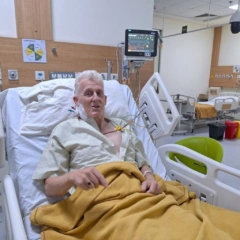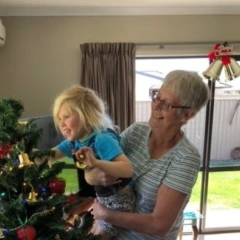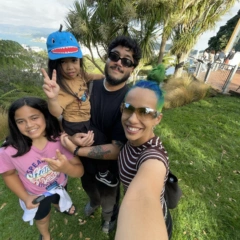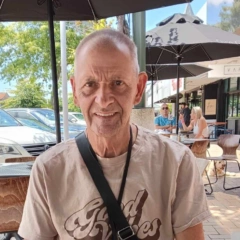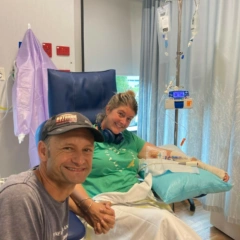Back to square one
“I’ve always been a very healthy guy,” says Richard. The 62-year-old university professor lives in Christchurch with his wife, Martha, and has dedicated much of his life to keeping fit and active.
“As a young fellow, I was a competitive athlete. I specialised in an event that most others thought was close to madness – the 400m with hurdles.” Even when it came time to call it quits on competing, Richard kept up a strict training schedule.
“So I was quite surprised when, one day in 2021, I started having massive pains in my chest. And, of course, when a 59-year-old has pains in his chest, everybody assumes it’s a heart condition. But I really didn’t think so.”
Despite his doubts, his wife rushed him to the hospital to get checked over. He was diagnosed with pneumonia and prescribed antibiotics.
Two months later, Richard was back at the hospital for a CT scan to check that his pneumonia had cleared up. “My lungs were fine,” he says. “But the scan showed that further down my torso, there was something else. The report described it as ‘potential lymphoma’.”
"It didn’t take too much online research for my wife and I to discover this meant ‘potential cancer’."
When a biopsy at the end of January 2022 confirmed Richard had stage 3 follicular lymphoma, his life changed dramatically. “It only took them two or three days after the biopsy results to get me directly onto the chemotherapy ward.”
Treatment with RCHOP chemotherapy brought a whole host of issues. As well as dealing with side effects like insomnia, nausea and constipation, Richard had to face his lifelong fear of needles head-on. “I have quite a phobia around that.”
Fortunately, Richard has had good support throughout his journey. Martha has been by his side through all the ups and downs, and he’s had LBC to lean on when needed.
Richard was first introduced to LBC when his local Support Services Coordinator, Kate, visited him at the hospital. “She gave me some pamphlets and information and asked me if I’d like to come to the meetings,” Richard says.
Since then, he’s stayed in touch with Kate and has continued to attend his local LBC support group. “I go as often as I can. It’s nice to swap stories with other patients. I hope that the conversations I have there are helpful to some of the other people, too.”
Richard made it through six rounds of chemo, at which point a scan showed that about 80% of the lymphoma was gone. His haematologist decided to stop treatment for the time being and monitor him closely.
“That would have been July, and I was back in trouble early the next year. I started having symptoms again in late 2022, and by the end of March 2023, I was essentially back to square one.”
This time, a more aggressive form of chemotherapy called GDP was used. “The first week of GDP was a living hell for me,” says Richard. “It really hit me hard, to the extent that I was seriously doubting whether I could continue. My body weight plummeted until I was little more than a bag of skin and bones.”
One night during this treatment, Richard suffered a huge internal bleed. He was rushed to the emergency department and needed to have over five litres of blood transfused. He remembers being told by the hospital staff that they’d never seen someone lose so much blood and survive.
After finishing his GDP treatment and then going through a gruelling stem cell transplant, a further scan revealed there were still areas of active lymphoma in Richard’s body. His haematologist gave him two final treatment options, but admitted that neither of them was perfect – one would be very risky, and the other was not a long-term solution.
The haematologist had, however, mentioned a newer type of treatment called CAR T-cell therapy, which had shown promising results for lymphoma patients like Richard. The only catch? CAR T-cell therapy wasn’t available in New Zealand, and Richard would have to self-fund the treatment overseas. “My haematologist talked about it being a million-dollar treatment.”
Still, hopeful that this might be his best chance of survival, Richard and his wife looked into it. Through their research, they discovered that India offered a state-of-the-art CAR T-cell programme that was much more affordable than those offered in countries such as Australia or the USA. By May 2024, the couple were on a flight to Bangalore for Richard to begin treatment at Cytecare Hospital.
“In the end, in my particular case, the cost of the entire journey to health ended up being somewhere around a couple of hundred thousand dollars, which I financed by cashing in my Kiwisaver and taking out a sizeable loan.”
The entire process took about two months and went surprisingly smoothly, with very few side effects. Just before he was due to fly home, Richard had his final scan and received the best possible news.
“The lymphoma was gone. The haematologist said, ‘You’re in total remission.’”
Now back home, Richard is feeling well. He’s started up his training again and has even managed to take a trip to Florida with his wife. Of course, he doesn’t know what the future holds – but as he awaits his next scan in June, Richard is hopeful for many years of good health ahead.

